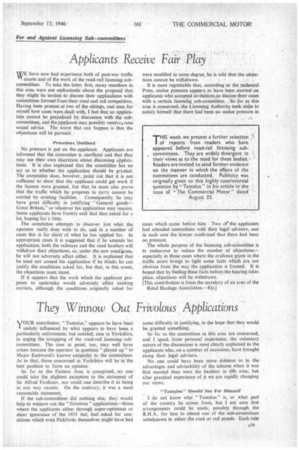Applicants Receive Fair Play
Page 41

If you've noticed an error in this article please click here to report it so we can fix it.
WE have now had experience both of post-war traffic "courts and of the work of the road-rail licensing subcommittees. To take the latter first, many members in this area were not enthusiastic about the proposal that they might be invited to discuss their applications with committees formed from their road and rail competitors. Having been present-at two of the sittings, and seen far myself how cases were dealt with, I feel that an application cannot be prejudiced by discussion with the subcommittees, and thtapplicant may possibly receivce, ome sound advice. The worst that can happen is that the
objections will be pursued. • Procedure „Outlined
No pressure is put on the .applicant. Applicants are informed that the committee is unofficial and that they may use their own discretion about discussing abplicalions. It is also explained that the committee has no say as to whether the application should be granted. The committee does, however, point out that it is not sufficient toshow -that the applicant could get work if the licence were granted, but that he must also prove that the traffic Which he proposes to carry cannot be
carried by existing facilities. Consequently, he may have great difficulty in justifying "General goods— Great Britain," or whatever his application may require. Some applicants have frankly said that they asked for a lot, hoping for a little.
The committee attempts to discover just what the operator really does wish to do, and in a number of cases this is far short of what he has applied for. In appropriate casts it is suggested that if he amends his application, both the railways and the road hauliers-will withdraw their objections, as, under the new condiions, he will not adversely affect either. It is explained that he need not amend his application if he thinks he can justify the conditions asked for, but that, in this event,
the objections must. stand. .
If it appears that the work which the applicant proposes to undertake would adversely affect existing carriers, although the conditions originally asked for were modified in some degree, he is told that the objec tions cannot be withdrawn. • It is most regrettable that, according to the technical Press, undue pressure appears to have been exerted on applicants who accepted invitations,to discuss their cases with a certain Iicensihg sub-comMittee. So far as this area is concerned, the Licensing Authority took steps to satisfy himself that there had been no undue pressure, in cases which came before him. Two or the applicants had attended committees with their legal" advisers, -and in each case the lawyer confirmed that there had been no pressure.
The whole purpose of the licensing sub-committee is to endeavour to reduce the number of objections— especially in those cases where the evidence given in the traffic court brings to light some facts which are not obvious from the way the application is framed. It is hoped that by finding these facts before the hearing takes place, objections will be withdrawn.
[This contribution is from the secretary of an area of the Road Haulage Association.—Eo.] •




































































